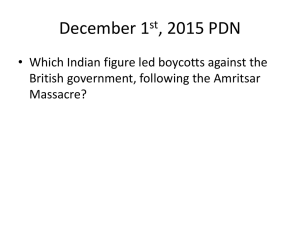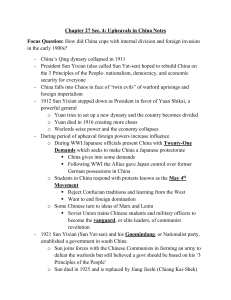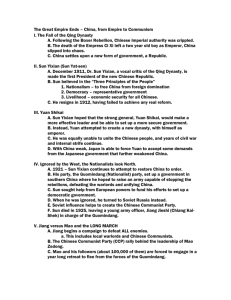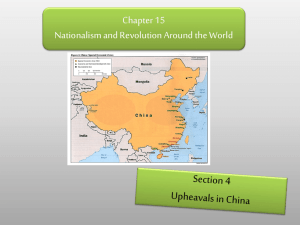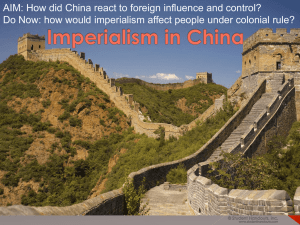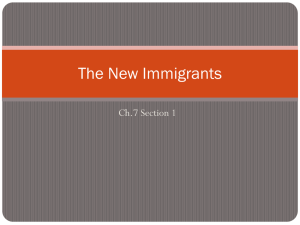REFORM EFFORTS IN CHINA -imperial court was full of conservatives
advertisement
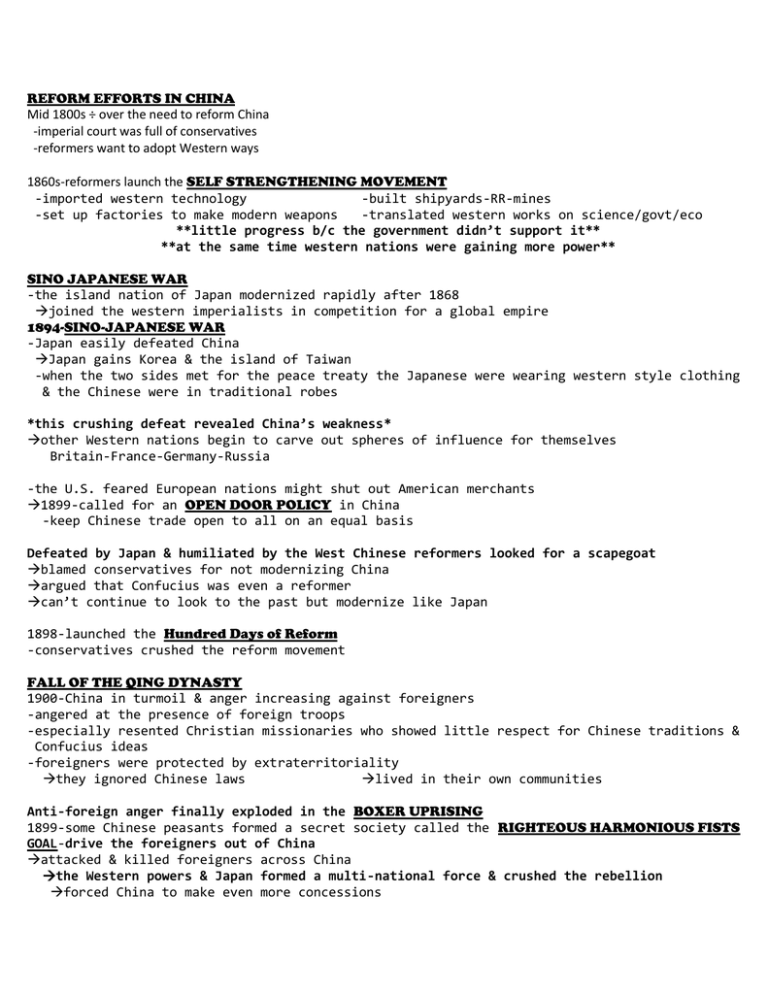
REFORM EFFORTS IN CHINA Mid 1800s ÷ over the need to reform China -imperial court was full of conservatives -reformers want to adopt Western ways 1860s-reformers launch the SELF STRENGTHENING MOVEMENT -imported western technology -built shipyards-RR-mines -set up factories to make modern weapons -translated western works on science/govt/eco **little progress b/c the government didn’t support it** **at the same time western nations were gaining more power** SINO JAPANESE WAR -the island nation of Japan modernized rapidly after 1868 joined the western imperialists in competition for a global empire 1894-SINO-JAPANESE WAR -Japan easily defeated China Japan gains Korea & the island of Taiwan -when the two sides met for the peace treaty the Japanese were wearing western style clothing & the Chinese were in traditional robes *this crushing defeat revealed China’s weakness* other Western nations begin to carve out spheres of influence for themselves Britain-France-Germany-Russia -the U.S. feared European nations might shut out American merchants 1899-called for an OPEN DOOR POLICY in China -keep Chinese trade open to all on an equal basis Defeated by Japan & humiliated by the West Chinese reformers looked for a scapegoat blamed conservatives for not modernizing China argued that Confucius was even a reformer can’t continue to look to the past but modernize like Japan 1898-launched the Hundred Days of Reform -conservatives crushed the reform movement FALL OF THE QING DYNASTY 1900-China in turmoil & anger increasing against foreigners -angered at the presence of foreign troops -especially resented Christian missionaries who showed little respect for Chinese traditions & Confucius ideas -foreigners were protected by extraterritoriality they ignored Chinese laws lived in their own communities Anti-foreign anger finally exploded in the BOXER UPRISING 1899-some Chinese peasants formed a secret society called the RIGHTEOUS HARMONIOUS FISTS GOAL-drive the foreigners out of China attacked & killed foreigners across China the Western powers & Japan formed a multi-national force & crushed the rebellion forced China to make even more concessions **Now even China’s conservatives realized that China needed to westernize** The Boxer Rebellion failed but it was successful in spreading nationalism throughout the country -reformers want a constitutional monarchy -some even wanted a republic SUN YIXIAN (SUN YAT-SEN) known as the father of modern China -young radical formed the REVOLUTIONARY ALLIANCE -wanted to rebuild China on the 3 Principles of the People 1. 2. 3. 1908-empress Ci Xi diesa two year old boy inherits the throne 1911-Sun & his followers start an uprising which quickly spreads throughout China with the help of peasants, students, local warlords, & even politicians 1912-the emperor abdicatesthe end of the Qing dynasty-ending China’s 2,000 year old monarchy Sun Yixian becomes president of the new Chinese republic but made little progress The new Chinese republic faced many problems -constantly at war with itself and dealing with foreign invaders -most of the Chinese people felt more loyalty to their family/clan than to the nation 1912 Sun Yixian steps down as president in favor of a powerful general YUAN SHIKAI -hoped Yuan could create a strong central government -instead he tried to set up a new dynasty 1916-Yuan Shikai diesChina is in even greater chaos & disorder -local warlords seize power in the provinces resulting in rival armies battling for control the economy collapsed famine peasants suffered During this period of upheaval & chaos foreign nations increased their influence in China -dominated port cities & extended their influence inland During WWI Japanese officials presented China with the Twenty-One Demands -list of demands that sought to make China a Japanese protectorate -China too weak to resistgive in to some of the demands 1919-Paris Peace Conference-the Allies gave Japan control over some former German possessions in China increasing Japan’s control over China In response-May 4th,1919 student protests erupted in Beijing & spread across China -organized boycotts of Japanese goods & businesses -these protests set off a cultural & intellectual movement-the MAY FOURTH MOVEMENT Goal –strengthen China -blamed the imperialists’ success on China’s weakness Chinese reformers wanted to learn from the West & use that knowledge to end foreign domination many begin to favor western science & ideas like democracy & nationalism -women played a key role in the movement campaigning to end traditional practices like footbinding -wanted to open doors for women in education & the economy CHINESE COMMUNISM IS BORN Some Chinese turned to the revolutionary ideas of Marx & Lenin -the Russian Revolution offered a model of how a strong, well-organized party could transform a nation Soviet Union trained Chinese students & military officers to become the vanguard or elite leaders of the communist revolution by 1920s a small group of Chinese communists formed a political party 1921-Sun Yixian & the Guomindang also known as the Nationalist Party established a government in S. China Sun planned to raise an armydefeat the warlordsunite China 1925-Sun Yixian diesJiang Jieshi (Chiang Kai-shek) takes over -has little interest in democracy or communism 1927-Jiang sees the communists as a threat to his power -orders the Guomindang to slaughter communist party membersthousands killed **the massacre marked the beginning of a bitter civil war between the communists & the Guomindang lasting 22 years** Among the communists that escaped Jiang’s attack was a young revolutionary-Mao Zedong -earlier Chinese communists wanted to seek support from the small urban working class but Mao wanted to gain support from the large peasant population Jiang Jieshi was determined to destroy the “red bandits” led the Guomindang in a series of extermination campaigns against them Mao along with 100,000 of his followers fled the Guomindang in an epic retreat known as the LONG MARCH 1934-35-trekked more than 6,000 miles facing daily attacks as they crossed rugged mountains & raging rivers -only about 20,000 survived During the Long March Mao enforced strict discipline -treat peasants politely -pay for goods they wanted -avoid damaging any crops For decades the Long March stood as a symbol of communist heroism& inspired new recruits to follow Mao -at the end of the Long March the communists set up a new base in a remote region in northern China there Mao built up his forces & plotted new strategies for fighting the Guomindang China Faces Japanese Imperialism While Jiang was pursuing the communists across China the country faced another danger 1931-Japan invaded Manchuria in Northern China as Japanese aggression increased some of Jiang’s generals pushed him to form a united front with the communists against Japan
